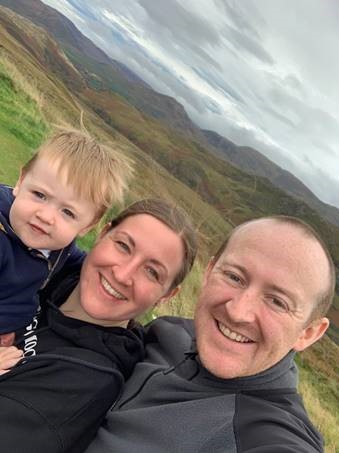"My own immune system was used to treat my cancer – now there’s no evidence of it”
Posted 20th November 2023
A young dad from Kirby who was diagnosed with skin cancer which then spread to his brain, has reason to be hopeful after recent scans showed no evidence of the disease, thanks to a unique cancer treatment called immunotherapy.

Calum Wyatt, 34, was diagnosed with melanoma, a serious form of skin cancer, in 2017 after tests on a mole on his shoulder showed it was cancer. Luckily, at the time the cancer hadn’t spread and after removing the mole, Calum was cancer free.
However in November 2021, Calum suffered a seizure when at home with his wife Claire, 33 and son Myles, 3. He was quickly diagnosed with a brain tumour, thought to have occurred after the melanoma had spread to his brain, as well as his liver, lungs, spleen and bones.
Calum said, “I was OK when the doctors initially called me to tell me the cancer had spread, but then the news started to sink in. Calum adds, “I’ve never used sunbeds and the only time I’ve really got sunburnt was on a lads’ holiday to Magaluf in my 20’s. Whilst we don’t know if that was the cause of my initial melanoma, I would never have thought I’d be going through all this.”
“It felt different to my first cancer diagnosis when I got melanoma; Claire and I didn’t have Miles then. So being a Dad to a young son, and being diagnosed with a brain tumour was incredibly hard for all of us.”
Following successful surgery to remove the tumour and confirmation that it was indeed melanoma, Calum was treated with immunotherapy, an effective but lesser known form of cancer treatment which harnesses the body’s own immune system to tackle cancer cells.
Calum was treated at The Clatterbridge Cancer Centre in Liverpool. The Clatterbridge Cancer Centre is the biggest provider of immunotherapy treatment in the country, treating more patients with the technique than any other hospital. Whilst effective, immunotherapy can cause serious side effects. To manage these, The Clatterbridge Cancer Centre established the UK’s first Specialist Immunotherapy Toxicity Service (SIOTS); a team of specialist nurses and doctors who identify and treat the side effects caused by immunotherapy.
Calum has stayed relatively well whilst having his immunotherapy treatment but has spent time in hospital when he’s suffered from fatigue and dizziness, something the SIOTS Team we’re quick to respond to. He was diagnosed with Adrenal Insufficiency, where Calum’s adrenal glands, small glands near the kidneys which help regulate things like metabolism, immune system and blood pressure, became inflamed and stopped working properly. Fortunately, this could be managed with tablet medication.
Trudie Guinan, Immuno-oncology Nurse Consultant at The Clatterbridge Cancer Centre, is part of the team treating Calum. She says: “I’m really delighted that Calum has responded so well to treatment and is feeling great. To help immunotherapy treatment be successful, it’s vital that we spot the early signs of side effects and deal with them quickly, which we were able to do for Calum by his melanoma team and the specialist immunotherapy toxicity service working closely together”.
“Sometimes, a patient only needs to call our helpline and speak to one of our specialist nurses who can help, rather than going to A&E and the earlier we know about something, the easier it to treat. Keeping patients well whilst on their treatment is so important because it means we don’t have to pause treatment and helps get the best outcomes for them. We keep striving for ways to support patients on immunotherapy treatment to help support them through the challenges of treatment to make the whole experience as easy as possible during a very difficult time.”
Calum is still currently receiving treatment every four weeks but is hopeful he will be able to finish in the New Year after recent scans showed there is no trace of cancer in his body.
“Waiting for my scan results was a really nervous time but to find out that there was no evidence of cancer was a massive relief. Claire, Myles and I are now starting to look to the future, planning a big family holiday and preparing Miles to start school next year. We’ve got everything crossed that I can finish my treatment very soon and really start getting my life back.”
